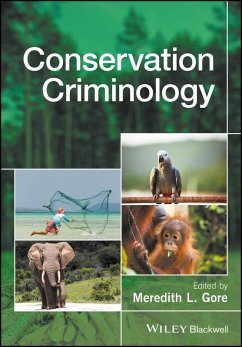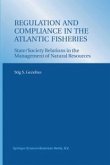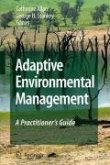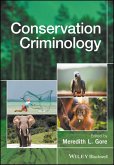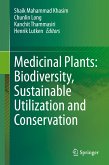Conservation Criminology (eBook, PDF)
Redaktion: Gore, Meredith L.
70,99 €
70,99 €
inkl. MwSt.
Sofort per Download lieferbar

0 °P sammeln
70,99 €
Als Download kaufen

70,99 €
inkl. MwSt.
Sofort per Download lieferbar

0 °P sammeln
Jetzt verschenken
Alle Infos zum eBook verschenken
70,99 €
inkl. MwSt.
Sofort per Download lieferbar
Alle Infos zum eBook verschenken

0 °P sammeln
Conservation Criminology (eBook, PDF)
Redaktion: Gore, Meredith L.
- Format: PDF
- Merkliste
- Auf die Merkliste
- Bewerten Bewerten
- Teilen
- Produkt teilen
- Produkterinnerung
- Produkterinnerung

Bitte loggen Sie sich zunächst in Ihr Kundenkonto ein oder registrieren Sie sich bei
bücher.de, um das eBook-Abo tolino select nutzen zu können.
Hier können Sie sich einloggen
Hier können Sie sich einloggen
Sie sind bereits eingeloggt. Klicken Sie auf 2. tolino select Abo, um fortzufahren.

Bitte loggen Sie sich zunächst in Ihr Kundenkonto ein oder registrieren Sie sich bei bücher.de, um das eBook-Abo tolino select nutzen zu können.
This important new text introduces conservation criminology as the interdisciplinary study of environmental exploitation and risks at the intersection of human and natural systems. Taking an interdisciplinary approach, the book enhances understanding of the various human and organizational behaviors that pose risks to the environment, humans, and drive conservation crime. As human population growth, global market economies, climate change, deforestation, and illegal exploitation of natural resources continue to increase, academic research from numerous disciplines is needed to address these…mehr
- Geräte: PC
- mit Kopierschutz
- eBook Hilfe
- Größe: 5.42MB
Andere Kunden interessierten sich auch für
![Regulation and Compliance in the Atlantic Fisheries (eBook, PDF) Regulation and Compliance in the Atlantic Fisheries (eBook, PDF)]() Stig S. GezeliusRegulation and Compliance in the Atlantic Fisheries (eBook, PDF)73,95 €
Stig S. GezeliusRegulation and Compliance in the Atlantic Fisheries (eBook, PDF)73,95 €![Adaptive Environmental Management (eBook, PDF) Adaptive Environmental Management (eBook, PDF)]() Adaptive Environmental Management (eBook, PDF)89,95 €
Adaptive Environmental Management (eBook, PDF)89,95 €![Conservation Criminology (eBook, ePUB) Conservation Criminology (eBook, ePUB)]() Conservation Criminology (eBook, ePUB)70,99 €
Conservation Criminology (eBook, ePUB)70,99 €![Ecosystem Geography (eBook, PDF) Ecosystem Geography (eBook, PDF)]() Robert G. BaileyEcosystem Geography (eBook, PDF)40,95 €
Robert G. BaileyEcosystem Geography (eBook, PDF)40,95 €![Medicinal Plants: Biodiversity, Sustainable Utilization and Conservation (eBook, PDF) Medicinal Plants: Biodiversity, Sustainable Utilization and Conservation (eBook, PDF)]() Medicinal Plants: Biodiversity, Sustainable Utilization and Conservation (eBook, PDF)202,95 €
Medicinal Plants: Biodiversity, Sustainable Utilization and Conservation (eBook, PDF)202,95 €![School Choice and School Governance (eBook, PDF) School Choice and School Governance (eBook, PDF)]() J. HerbstSchool Choice and School Governance (eBook, PDF)40,95 €
J. HerbstSchool Choice and School Governance (eBook, PDF)40,95 €![Protist Diversity and Geographical Distribution (eBook, PDF) Protist Diversity and Geographical Distribution (eBook, PDF)]() Protist Diversity and Geographical Distribution (eBook, PDF)177,95 €
Protist Diversity and Geographical Distribution (eBook, PDF)177,95 €-
-
-
This important new text introduces conservation criminology as the interdisciplinary study of environmental exploitation and risks at the intersection of human and natural systems. Taking an interdisciplinary approach, the book enhances understanding of the various human and organizational behaviors that pose risks to the environment, humans, and drive conservation crime. As human population growth, global market economies, climate change, deforestation, and illegal exploitation of natural resources continue to increase, academic research from numerous disciplines is needed to address these challenges.
Conservation Criminology promotes thinking about how unsustainable natural resources exploitation is a cause and a consequence of social conflict. Case studies profiled in the book demonstrate this cause and effect type situation, as well as innovative approaches for reducing risks to people and the environment. This text encourages readers to consider how humans behave in response to environmental risks and the various mechanisms that constitute effective and ineffective approaches to enforcement of wildlife crimes, including environmental and conservation policy. Case studies from the USA, Latin America, Africa, and Asia highlight corruption in conservation, global trade in electronic waste, illegal fishing, illegal logging, human-wildlife conflict, technology and space, water insecurity, wildlife disease, and wildlife poaching. Taken together, chapters expand the reader's perspective and employ tools to understand and address environmental crimes and risks, and to provide novel empirical evidence for positive change. With established contributors providing interdisciplinary and global perspectives, this book establishes a foundation for the emerging field of conservation criminology.
Conservation Criminology promotes thinking about how unsustainable natural resources exploitation is a cause and a consequence of social conflict. Case studies profiled in the book demonstrate this cause and effect type situation, as well as innovative approaches for reducing risks to people and the environment. This text encourages readers to consider how humans behave in response to environmental risks and the various mechanisms that constitute effective and ineffective approaches to enforcement of wildlife crimes, including environmental and conservation policy. Case studies from the USA, Latin America, Africa, and Asia highlight corruption in conservation, global trade in electronic waste, illegal fishing, illegal logging, human-wildlife conflict, technology and space, water insecurity, wildlife disease, and wildlife poaching. Taken together, chapters expand the reader's perspective and employ tools to understand and address environmental crimes and risks, and to provide novel empirical evidence for positive change. With established contributors providing interdisciplinary and global perspectives, this book establishes a foundation for the emerging field of conservation criminology.
Dieser Download kann aus rechtlichen Gründen nur mit Rechnungsadresse in D ausgeliefert werden.
Produktdetails
- Produktdetails
- Verlag: For Dummies
- Erscheinungstermin: 14. März 2017
- Englisch
- ISBN-13: 9781118935491
- Artikelnr.: 48046687
- Verlag: For Dummies
- Erscheinungstermin: 14. März 2017
- Englisch
- ISBN-13: 9781118935491
- Artikelnr.: 48046687
- Herstellerkennzeichnung Die Herstellerinformationen sind derzeit nicht verfügbar.
About the editor Meredith L. Gore is a conservation social scientist whose interdisciplinary research explores relationships between human behavior and the environment. She is an Associate Professor in the Department of Fisheries & Wildlife and School of Criminal Justice at Michigan State University (MSU) and Jefferson Science Fellow with the US Department of State. Dr. Gore is a MSU Global Research Fellow and President of the Society for Conservation Biology's Social Science Working Group.
Notes on Contributors xiii
Preface xxi
Acknowledgments xxiii
1 Global Risks, Conservation, and Criminology 1
Meredith L. Gore
1.1 Conservation Crimes Are a Global Problem 1
1.2 Three Foundational Fields of Conservation Criminology 4
1.3 Foundation 1: Natural Resource Management and Policy 4
1.3.1 Different Values Underlie Natural Resource Management and
Conservation 4
1.3.2 The Precautionary Principle and Prevention 6
1.3.3 Community?-Based Conservation 6
1.3.4 Protected Areas 7
1.4 Foundation 2: Criminology, Crime Science, and Criminal Justice 8
1.4.1 Opportunity Structures of Crime 9
1.4.2 Crime Prevention 10
1.4.3 Criminological Typologies 11
1.5 Foundation 3: Risk and Decision Science 11
1.5.1 Risk Assessment and Perception 13
1.5.2 Risk Communication 14
1.5.3 Risk Governance 14
1.6 Combining the Three Foundations: Conservation Criminology 15
1.6.1 Strengths 16
1.6.2 Shortcomings 16
1.7 How to "Do" Conservation Criminology 17
1.8 Roadmap 18
References 20
Part I Conceptual Advancements in Conservation Criminology
2 Conservation Crime Science 27
Jessica S. Kahler and Meredith L. Gore
2.1 Exploitation of Natural Resources in a Globalized World 27
2.2 The Limits of Criminology for Conservation Practice 28
2.3 Overcoming the Limits of Criminology with Crime Science 30
2.4 State of Knowledge: Conservation Criminology and Conservation Crime
Science 31
2.4.1 Describing the Literature 32
2.5 Limitations 36
2.6 Utility of Using Conservation Crime Science 37
2.7 Setting Expectations for Conservation Crime Science 38
2.8 Conclusion 39
References 41
3 Deterrence, Legitimacy, and Wildlife Crime in Protected Areas 45
William D. Moreto and Jacinta M. Gau
3.1 Wildlife Crime in Protected Areas 46
3.2 Criminological and Criminal Justice Perspectives on Deterrence 46
3.2.1 Theoretical Foundations 46
3.3 Empirical Findings 48
3.4 Limitations with Deterrence?-based Approaches in Protected Areas 48
3.5 Legitimacy and Its Role in Establishing Normative and Instrumental
Forms of Compliance in Conservation 51
3.6 Alternatives to Deterrence?-Based Approaches 52
3.6.1 Enhancing Legitimacy 52
3.7 Future Considerations 53
References 54
Part II Case Studies and Examples
4 Governance for Conservation Risks and Crime 61
Mark A. Axelrod, Austin Flowers, Katherine Groff, and Julia Novak Colwell
4.1 Defining Governance 61
4.2 General Concepts of Governance for Conservation Risks 62
4.3 Strict Enforcement by Official Authorities and Governments 63
4.4 International Movement of Electronic Waste 63
4.5 Regulatory Efforts to Limit E?-waste Trade 65
4.6 People?-Centered Approaches Focused Local Livelihoods 67
4.7 Limits to Enforcement Actions in Chiquibul National Park, Belize 68
4.8 Limits of Alternative Livelihood Strategies 68
4.9 Unintended Effects and Collateral Impacts of Conservation Governance 69
4.10 Conclusion 71
References 71
5 Gaining Compliance and Cooperation with Regulated Wildlife Harvest 77
Brent A. Rudolph and Shawn J. Riley
5.1 Importance of Compliance and Cooperation 78
5.2 What Drives Violations of Natural Resource Regulations? 80
5.3 Unintentional Violations 81
5.4 Intentional Violations 81
5.5 Violations Motivated by Direct Personal Gains 82
5.6 Violations Motivated by Indirect Personal Gains 83
5.7 Violations and Instrumental Judgments of Government Policy and
Regulators 84
5.8 Violations and Normative Influence 85
5.9 What Drives Cooperation? 86
5.10 Considerations for Increasing Compliance and Cooperation 87
5.10.1 Applying Regulations to Influence Compliance 88
5.10.2 Applying Economic Instruments to Influence Compliance and
Cooperation 89
5.10.3 Applying Communication to Influence Compliance and Cooperation 90
5.10.4 Communication to Influence Instrumental Judgments 90
5.10.5 Communication to Influence Behavior Through Norms 91
5.10.6 Communication to Influence Procedural Justice 91
5.11 Conclusion 92
References 92
6 Corruption and Organized Crime in Conservation 97
Aksel Sundström and Tanya Wyatt
6.1 Connecting Corruption and Organized Crime to Conservation 99
6.1.1 Defining Corruption and Organized Crime 99
6.1.2 The Role and Extent of Corruption and Organized Crime in Conservation
Crime 100
6.1.3 Why do Environmental Black Markets Exist? 102
6.2 Case Study on Abalone Poaching 102
6.2.1 The Context of Bureaucratic Corruption and Presence of Criminal
Groups 102
6.2.2 The Investigation 104
6.2.3 Non?-Corrupt Inspectors are Threatened 104
6.3 Case Study on Illegal Trade in Russian Raptors 105
6.4 A Policy?-Oriented Discussion of Solutions 107
6.4.1 Supporting Non?-Corrupt Officials That Receive Threats 107
6.4.2 Complement Merit?-Based Reforms with External Monitoring Mechanisms
107
6.4.3 Public Awareness Campaigns May Help Decrease Demand for Illicit Goods
108
6.4.4 A Cooperative Network Approach to Combating Organized Crime 109
6.5 Conclusion 109
References 110
7 Problem?-Oriented Policing for Natural Resource Conservation 115
Mark C. G. Gibson
7.1 What is Problem?-Oriented Policing? 115
7.2 The Opportunity for POP in Natural Resource Management 119
7.3 A Case Study of Australian Commonwealth Fisheries Management 120
7.3.1 The Australian Fisheries Management Authority 120
7.3.2 Scanning 123
7.3.3 Analysis 124
7.3.4 Response 125
7.3.5 Assessment 126
7.4 Adapting POP for More Effective Conservation 127
7.5 Conclusion 129
References 129
8 Exploring the Sociology of Wildlife Tourism, Global Risks, and Crime 133
Jessica Bell Rizzolo
8.1 Wildlife Tourism 134
8.1.1 Types of Wildlife Tourism 134
8.1.2 Benefits of Wildlife Tourism Link Biodiversity Conservation and
Livelihood Preservation 134
8.1.3 Risks Associated with Wildlife Tourism 135
8.2 Conservation Criminology and Wildlife Tourism 136
8.2.1 Natural Resources Management and Conservation Biology 137
8.2.2 Risk and Decision Science 137
8.2.3 Criminology 138
8.3 Theoretical Insights on Wildlife Tourism from Sociology 139
8.3.1 Wildlife Tourism and Power 139
8.3.2 Authenticity as a Sociological Aspect of Tourism 141
8.4 Elephant Tourism and Crime in Thailand 144
8.4.1 Elephant Tourism in Thailand 144
8.4.2 Wild Live Elephant Trafficking 144
8.4.3 Illegal Ivory Trade 145
8.4.4 Animal Welfare 145
8.4.5 Elephant Tourism and Crime: Insights From Conservation Criminology
and Sociological Theory 148
8.5 Conclusion 150
References 151
Part III Models and Innovations
9 Technological Innovations Supporting Wildlife Crime Detection,
Deterrence, and Enforcement 157
Heidi Kretser, Emma Stokes, Serge Wich, David Foran, and Alexa Montefiore
9.1 Challenges for Wildlife Crime Detection and Enforcement 158
9.2 Technological Advances in Conservation 160
9.3 Spatial Monitoring and Reporting Tool (SMART) 161
9.3.1 Limitations of SMART Technology and Opportunities for Future
Improvements 163
9.4 Conservation Drones 164
9.4.1 Limitations of Drone Technology and Opportunities for Future
Improvements 166
9.5 Mobile Device Applications 167
9.5.1 Limitations of Mobile App Technology and Opportunities for Future
Improvements 168
9.6 Conservation Forensics 171
9.6.1 Limitations of Forensic Technology and Opportunities for Future
Improvements 173
9.7 Conclusion 174
References 175
10 PAWS: Game Theory Based Protection Assistant for Wildlife Security 179
Fei Fang, Benjamin Ford, Rong Yang, Milind Tambe, and Andrew M. Lemieux
10.1 Applying Game Theoretic Analysis to Poaching 180
10.2 Modeling Human Behavior to Create Optimal Patrol Strategies 181
10.3 Domain Feature Modeling 181
10.4 The Genesis of PAWS from Synthesizing Conservation, Computer Science,
and Criminology 182
10.4.1 Describing the Poaching Domain to Create Patrols that Prevent
Poaching 184
10.5 The PAWS Model 185
10.5.1 The Basis of Game?-Theoretic Analysis in PAWS 186
10.5.2 Modeling Human Behavior for PAWS 188
10.5.3 Incorporating Learning into the Behavioral Model 189
10.6 PAWS?-Learn 189
10.6.1 Domain Feature Modeling 190
10.7 Discussion 192
References 193
11 Estimating Poaching Opportunity and Potential 197
Adrian Treves, Christine Browne-Nuñez, Jamie Hogberg, Jens Karlsson Frank,
Lisa Naughton-Treves, Nicole Rust, and Zachary Voyles
11.1 Understanding Attitudes and Behaviors of Realized and Potential
Poachers 198
11.2 Social Psychological Approaches for Understanding the Potential to
Poach 200
11.3 Case Study on Wolf Poaching 200
11.3.1 Theoretical Approach and Sampling 200
11.3.2 Methods 203
11.3.3 Study Site 203
11.3.4 Study Respondents 204
11.3.5 Survey Items 204
11.3.6 Inclination to Poach 205
11.3.7 Modeling Potential to Poach 205
11.4 Results 206
11.4.1 Potential to Poach 206
11.4.2 Effects on Wolf Population 207
11.4.3 Implications for Theory and Practice 207
11.4.4 Deer Hunters 208
11.4.5 Complainant Sample 209
11.5 Theoretical Considerations on the Causes of Poaching 210
References 212
Index 217
Preface xxi
Acknowledgments xxiii
1 Global Risks, Conservation, and Criminology 1
Meredith L. Gore
1.1 Conservation Crimes Are a Global Problem 1
1.2 Three Foundational Fields of Conservation Criminology 4
1.3 Foundation 1: Natural Resource Management and Policy 4
1.3.1 Different Values Underlie Natural Resource Management and
Conservation 4
1.3.2 The Precautionary Principle and Prevention 6
1.3.3 Community?-Based Conservation 6
1.3.4 Protected Areas 7
1.4 Foundation 2: Criminology, Crime Science, and Criminal Justice 8
1.4.1 Opportunity Structures of Crime 9
1.4.2 Crime Prevention 10
1.4.3 Criminological Typologies 11
1.5 Foundation 3: Risk and Decision Science 11
1.5.1 Risk Assessment and Perception 13
1.5.2 Risk Communication 14
1.5.3 Risk Governance 14
1.6 Combining the Three Foundations: Conservation Criminology 15
1.6.1 Strengths 16
1.6.2 Shortcomings 16
1.7 How to "Do" Conservation Criminology 17
1.8 Roadmap 18
References 20
Part I Conceptual Advancements in Conservation Criminology
2 Conservation Crime Science 27
Jessica S. Kahler and Meredith L. Gore
2.1 Exploitation of Natural Resources in a Globalized World 27
2.2 The Limits of Criminology for Conservation Practice 28
2.3 Overcoming the Limits of Criminology with Crime Science 30
2.4 State of Knowledge: Conservation Criminology and Conservation Crime
Science 31
2.4.1 Describing the Literature 32
2.5 Limitations 36
2.6 Utility of Using Conservation Crime Science 37
2.7 Setting Expectations for Conservation Crime Science 38
2.8 Conclusion 39
References 41
3 Deterrence, Legitimacy, and Wildlife Crime in Protected Areas 45
William D. Moreto and Jacinta M. Gau
3.1 Wildlife Crime in Protected Areas 46
3.2 Criminological and Criminal Justice Perspectives on Deterrence 46
3.2.1 Theoretical Foundations 46
3.3 Empirical Findings 48
3.4 Limitations with Deterrence?-based Approaches in Protected Areas 48
3.5 Legitimacy and Its Role in Establishing Normative and Instrumental
Forms of Compliance in Conservation 51
3.6 Alternatives to Deterrence?-Based Approaches 52
3.6.1 Enhancing Legitimacy 52
3.7 Future Considerations 53
References 54
Part II Case Studies and Examples
4 Governance for Conservation Risks and Crime 61
Mark A. Axelrod, Austin Flowers, Katherine Groff, and Julia Novak Colwell
4.1 Defining Governance 61
4.2 General Concepts of Governance for Conservation Risks 62
4.3 Strict Enforcement by Official Authorities and Governments 63
4.4 International Movement of Electronic Waste 63
4.5 Regulatory Efforts to Limit E?-waste Trade 65
4.6 People?-Centered Approaches Focused Local Livelihoods 67
4.7 Limits to Enforcement Actions in Chiquibul National Park, Belize 68
4.8 Limits of Alternative Livelihood Strategies 68
4.9 Unintended Effects and Collateral Impacts of Conservation Governance 69
4.10 Conclusion 71
References 71
5 Gaining Compliance and Cooperation with Regulated Wildlife Harvest 77
Brent A. Rudolph and Shawn J. Riley
5.1 Importance of Compliance and Cooperation 78
5.2 What Drives Violations of Natural Resource Regulations? 80
5.3 Unintentional Violations 81
5.4 Intentional Violations 81
5.5 Violations Motivated by Direct Personal Gains 82
5.6 Violations Motivated by Indirect Personal Gains 83
5.7 Violations and Instrumental Judgments of Government Policy and
Regulators 84
5.8 Violations and Normative Influence 85
5.9 What Drives Cooperation? 86
5.10 Considerations for Increasing Compliance and Cooperation 87
5.10.1 Applying Regulations to Influence Compliance 88
5.10.2 Applying Economic Instruments to Influence Compliance and
Cooperation 89
5.10.3 Applying Communication to Influence Compliance and Cooperation 90
5.10.4 Communication to Influence Instrumental Judgments 90
5.10.5 Communication to Influence Behavior Through Norms 91
5.10.6 Communication to Influence Procedural Justice 91
5.11 Conclusion 92
References 92
6 Corruption and Organized Crime in Conservation 97
Aksel Sundström and Tanya Wyatt
6.1 Connecting Corruption and Organized Crime to Conservation 99
6.1.1 Defining Corruption and Organized Crime 99
6.1.2 The Role and Extent of Corruption and Organized Crime in Conservation
Crime 100
6.1.3 Why do Environmental Black Markets Exist? 102
6.2 Case Study on Abalone Poaching 102
6.2.1 The Context of Bureaucratic Corruption and Presence of Criminal
Groups 102
6.2.2 The Investigation 104
6.2.3 Non?-Corrupt Inspectors are Threatened 104
6.3 Case Study on Illegal Trade in Russian Raptors 105
6.4 A Policy?-Oriented Discussion of Solutions 107
6.4.1 Supporting Non?-Corrupt Officials That Receive Threats 107
6.4.2 Complement Merit?-Based Reforms with External Monitoring Mechanisms
107
6.4.3 Public Awareness Campaigns May Help Decrease Demand for Illicit Goods
108
6.4.4 A Cooperative Network Approach to Combating Organized Crime 109
6.5 Conclusion 109
References 110
7 Problem?-Oriented Policing for Natural Resource Conservation 115
Mark C. G. Gibson
7.1 What is Problem?-Oriented Policing? 115
7.2 The Opportunity for POP in Natural Resource Management 119
7.3 A Case Study of Australian Commonwealth Fisheries Management 120
7.3.1 The Australian Fisheries Management Authority 120
7.3.2 Scanning 123
7.3.3 Analysis 124
7.3.4 Response 125
7.3.5 Assessment 126
7.4 Adapting POP for More Effective Conservation 127
7.5 Conclusion 129
References 129
8 Exploring the Sociology of Wildlife Tourism, Global Risks, and Crime 133
Jessica Bell Rizzolo
8.1 Wildlife Tourism 134
8.1.1 Types of Wildlife Tourism 134
8.1.2 Benefits of Wildlife Tourism Link Biodiversity Conservation and
Livelihood Preservation 134
8.1.3 Risks Associated with Wildlife Tourism 135
8.2 Conservation Criminology and Wildlife Tourism 136
8.2.1 Natural Resources Management and Conservation Biology 137
8.2.2 Risk and Decision Science 137
8.2.3 Criminology 138
8.3 Theoretical Insights on Wildlife Tourism from Sociology 139
8.3.1 Wildlife Tourism and Power 139
8.3.2 Authenticity as a Sociological Aspect of Tourism 141
8.4 Elephant Tourism and Crime in Thailand 144
8.4.1 Elephant Tourism in Thailand 144
8.4.2 Wild Live Elephant Trafficking 144
8.4.3 Illegal Ivory Trade 145
8.4.4 Animal Welfare 145
8.4.5 Elephant Tourism and Crime: Insights From Conservation Criminology
and Sociological Theory 148
8.5 Conclusion 150
References 151
Part III Models and Innovations
9 Technological Innovations Supporting Wildlife Crime Detection,
Deterrence, and Enforcement 157
Heidi Kretser, Emma Stokes, Serge Wich, David Foran, and Alexa Montefiore
9.1 Challenges for Wildlife Crime Detection and Enforcement 158
9.2 Technological Advances in Conservation 160
9.3 Spatial Monitoring and Reporting Tool (SMART) 161
9.3.1 Limitations of SMART Technology and Opportunities for Future
Improvements 163
9.4 Conservation Drones 164
9.4.1 Limitations of Drone Technology and Opportunities for Future
Improvements 166
9.5 Mobile Device Applications 167
9.5.1 Limitations of Mobile App Technology and Opportunities for Future
Improvements 168
9.6 Conservation Forensics 171
9.6.1 Limitations of Forensic Technology and Opportunities for Future
Improvements 173
9.7 Conclusion 174
References 175
10 PAWS: Game Theory Based Protection Assistant for Wildlife Security 179
Fei Fang, Benjamin Ford, Rong Yang, Milind Tambe, and Andrew M. Lemieux
10.1 Applying Game Theoretic Analysis to Poaching 180
10.2 Modeling Human Behavior to Create Optimal Patrol Strategies 181
10.3 Domain Feature Modeling 181
10.4 The Genesis of PAWS from Synthesizing Conservation, Computer Science,
and Criminology 182
10.4.1 Describing the Poaching Domain to Create Patrols that Prevent
Poaching 184
10.5 The PAWS Model 185
10.5.1 The Basis of Game?-Theoretic Analysis in PAWS 186
10.5.2 Modeling Human Behavior for PAWS 188
10.5.3 Incorporating Learning into the Behavioral Model 189
10.6 PAWS?-Learn 189
10.6.1 Domain Feature Modeling 190
10.7 Discussion 192
References 193
11 Estimating Poaching Opportunity and Potential 197
Adrian Treves, Christine Browne-Nuñez, Jamie Hogberg, Jens Karlsson Frank,
Lisa Naughton-Treves, Nicole Rust, and Zachary Voyles
11.1 Understanding Attitudes and Behaviors of Realized and Potential
Poachers 198
11.2 Social Psychological Approaches for Understanding the Potential to
Poach 200
11.3 Case Study on Wolf Poaching 200
11.3.1 Theoretical Approach and Sampling 200
11.3.2 Methods 203
11.3.3 Study Site 203
11.3.4 Study Respondents 204
11.3.5 Survey Items 204
11.3.6 Inclination to Poach 205
11.3.7 Modeling Potential to Poach 205
11.4 Results 206
11.4.1 Potential to Poach 206
11.4.2 Effects on Wolf Population 207
11.4.3 Implications for Theory and Practice 207
11.4.4 Deer Hunters 208
11.4.5 Complainant Sample 209
11.5 Theoretical Considerations on the Causes of Poaching 210
References 212
Index 217
Notes on Contributors xiii
Preface xxi
Acknowledgments xxiii
1 Global Risks, Conservation, and Criminology 1
Meredith L. Gore
1.1 Conservation Crimes Are a Global Problem 1
1.2 Three Foundational Fields of Conservation Criminology 4
1.3 Foundation 1: Natural Resource Management and Policy 4
1.3.1 Different Values Underlie Natural Resource Management and
Conservation 4
1.3.2 The Precautionary Principle and Prevention 6
1.3.3 Community?-Based Conservation 6
1.3.4 Protected Areas 7
1.4 Foundation 2: Criminology, Crime Science, and Criminal Justice 8
1.4.1 Opportunity Structures of Crime 9
1.4.2 Crime Prevention 10
1.4.3 Criminological Typologies 11
1.5 Foundation 3: Risk and Decision Science 11
1.5.1 Risk Assessment and Perception 13
1.5.2 Risk Communication 14
1.5.3 Risk Governance 14
1.6 Combining the Three Foundations: Conservation Criminology 15
1.6.1 Strengths 16
1.6.2 Shortcomings 16
1.7 How to "Do" Conservation Criminology 17
1.8 Roadmap 18
References 20
Part I Conceptual Advancements in Conservation Criminology
2 Conservation Crime Science 27
Jessica S. Kahler and Meredith L. Gore
2.1 Exploitation of Natural Resources in a Globalized World 27
2.2 The Limits of Criminology for Conservation Practice 28
2.3 Overcoming the Limits of Criminology with Crime Science 30
2.4 State of Knowledge: Conservation Criminology and Conservation Crime
Science 31
2.4.1 Describing the Literature 32
2.5 Limitations 36
2.6 Utility of Using Conservation Crime Science 37
2.7 Setting Expectations for Conservation Crime Science 38
2.8 Conclusion 39
References 41
3 Deterrence, Legitimacy, and Wildlife Crime in Protected Areas 45
William D. Moreto and Jacinta M. Gau
3.1 Wildlife Crime in Protected Areas 46
3.2 Criminological and Criminal Justice Perspectives on Deterrence 46
3.2.1 Theoretical Foundations 46
3.3 Empirical Findings 48
3.4 Limitations with Deterrence?-based Approaches in Protected Areas 48
3.5 Legitimacy and Its Role in Establishing Normative and Instrumental
Forms of Compliance in Conservation 51
3.6 Alternatives to Deterrence?-Based Approaches 52
3.6.1 Enhancing Legitimacy 52
3.7 Future Considerations 53
References 54
Part II Case Studies and Examples
4 Governance for Conservation Risks and Crime 61
Mark A. Axelrod, Austin Flowers, Katherine Groff, and Julia Novak Colwell
4.1 Defining Governance 61
4.2 General Concepts of Governance for Conservation Risks 62
4.3 Strict Enforcement by Official Authorities and Governments 63
4.4 International Movement of Electronic Waste 63
4.5 Regulatory Efforts to Limit E?-waste Trade 65
4.6 People?-Centered Approaches Focused Local Livelihoods 67
4.7 Limits to Enforcement Actions in Chiquibul National Park, Belize 68
4.8 Limits of Alternative Livelihood Strategies 68
4.9 Unintended Effects and Collateral Impacts of Conservation Governance 69
4.10 Conclusion 71
References 71
5 Gaining Compliance and Cooperation with Regulated Wildlife Harvest 77
Brent A. Rudolph and Shawn J. Riley
5.1 Importance of Compliance and Cooperation 78
5.2 What Drives Violations of Natural Resource Regulations? 80
5.3 Unintentional Violations 81
5.4 Intentional Violations 81
5.5 Violations Motivated by Direct Personal Gains 82
5.6 Violations Motivated by Indirect Personal Gains 83
5.7 Violations and Instrumental Judgments of Government Policy and
Regulators 84
5.8 Violations and Normative Influence 85
5.9 What Drives Cooperation? 86
5.10 Considerations for Increasing Compliance and Cooperation 87
5.10.1 Applying Regulations to Influence Compliance 88
5.10.2 Applying Economic Instruments to Influence Compliance and
Cooperation 89
5.10.3 Applying Communication to Influence Compliance and Cooperation 90
5.10.4 Communication to Influence Instrumental Judgments 90
5.10.5 Communication to Influence Behavior Through Norms 91
5.10.6 Communication to Influence Procedural Justice 91
5.11 Conclusion 92
References 92
6 Corruption and Organized Crime in Conservation 97
Aksel Sundström and Tanya Wyatt
6.1 Connecting Corruption and Organized Crime to Conservation 99
6.1.1 Defining Corruption and Organized Crime 99
6.1.2 The Role and Extent of Corruption and Organized Crime in Conservation
Crime 100
6.1.3 Why do Environmental Black Markets Exist? 102
6.2 Case Study on Abalone Poaching 102
6.2.1 The Context of Bureaucratic Corruption and Presence of Criminal
Groups 102
6.2.2 The Investigation 104
6.2.3 Non?-Corrupt Inspectors are Threatened 104
6.3 Case Study on Illegal Trade in Russian Raptors 105
6.4 A Policy?-Oriented Discussion of Solutions 107
6.4.1 Supporting Non?-Corrupt Officials That Receive Threats 107
6.4.2 Complement Merit?-Based Reforms with External Monitoring Mechanisms
107
6.4.3 Public Awareness Campaigns May Help Decrease Demand for Illicit Goods
108
6.4.4 A Cooperative Network Approach to Combating Organized Crime 109
6.5 Conclusion 109
References 110
7 Problem?-Oriented Policing for Natural Resource Conservation 115
Mark C. G. Gibson
7.1 What is Problem?-Oriented Policing? 115
7.2 The Opportunity for POP in Natural Resource Management 119
7.3 A Case Study of Australian Commonwealth Fisheries Management 120
7.3.1 The Australian Fisheries Management Authority 120
7.3.2 Scanning 123
7.3.3 Analysis 124
7.3.4 Response 125
7.3.5 Assessment 126
7.4 Adapting POP for More Effective Conservation 127
7.5 Conclusion 129
References 129
8 Exploring the Sociology of Wildlife Tourism, Global Risks, and Crime 133
Jessica Bell Rizzolo
8.1 Wildlife Tourism 134
8.1.1 Types of Wildlife Tourism 134
8.1.2 Benefits of Wildlife Tourism Link Biodiversity Conservation and
Livelihood Preservation 134
8.1.3 Risks Associated with Wildlife Tourism 135
8.2 Conservation Criminology and Wildlife Tourism 136
8.2.1 Natural Resources Management and Conservation Biology 137
8.2.2 Risk and Decision Science 137
8.2.3 Criminology 138
8.3 Theoretical Insights on Wildlife Tourism from Sociology 139
8.3.1 Wildlife Tourism and Power 139
8.3.2 Authenticity as a Sociological Aspect of Tourism 141
8.4 Elephant Tourism and Crime in Thailand 144
8.4.1 Elephant Tourism in Thailand 144
8.4.2 Wild Live Elephant Trafficking 144
8.4.3 Illegal Ivory Trade 145
8.4.4 Animal Welfare 145
8.4.5 Elephant Tourism and Crime: Insights From Conservation Criminology
and Sociological Theory 148
8.5 Conclusion 150
References 151
Part III Models and Innovations
9 Technological Innovations Supporting Wildlife Crime Detection,
Deterrence, and Enforcement 157
Heidi Kretser, Emma Stokes, Serge Wich, David Foran, and Alexa Montefiore
9.1 Challenges for Wildlife Crime Detection and Enforcement 158
9.2 Technological Advances in Conservation 160
9.3 Spatial Monitoring and Reporting Tool (SMART) 161
9.3.1 Limitations of SMART Technology and Opportunities for Future
Improvements 163
9.4 Conservation Drones 164
9.4.1 Limitations of Drone Technology and Opportunities for Future
Improvements 166
9.5 Mobile Device Applications 167
9.5.1 Limitations of Mobile App Technology and Opportunities for Future
Improvements 168
9.6 Conservation Forensics 171
9.6.1 Limitations of Forensic Technology and Opportunities for Future
Improvements 173
9.7 Conclusion 174
References 175
10 PAWS: Game Theory Based Protection Assistant for Wildlife Security 179
Fei Fang, Benjamin Ford, Rong Yang, Milind Tambe, and Andrew M. Lemieux
10.1 Applying Game Theoretic Analysis to Poaching 180
10.2 Modeling Human Behavior to Create Optimal Patrol Strategies 181
10.3 Domain Feature Modeling 181
10.4 The Genesis of PAWS from Synthesizing Conservation, Computer Science,
and Criminology 182
10.4.1 Describing the Poaching Domain to Create Patrols that Prevent
Poaching 184
10.5 The PAWS Model 185
10.5.1 The Basis of Game?-Theoretic Analysis in PAWS 186
10.5.2 Modeling Human Behavior for PAWS 188
10.5.3 Incorporating Learning into the Behavioral Model 189
10.6 PAWS?-Learn 189
10.6.1 Domain Feature Modeling 190
10.7 Discussion 192
References 193
11 Estimating Poaching Opportunity and Potential 197
Adrian Treves, Christine Browne-Nuñez, Jamie Hogberg, Jens Karlsson Frank,
Lisa Naughton-Treves, Nicole Rust, and Zachary Voyles
11.1 Understanding Attitudes and Behaviors of Realized and Potential
Poachers 198
11.2 Social Psychological Approaches for Understanding the Potential to
Poach 200
11.3 Case Study on Wolf Poaching 200
11.3.1 Theoretical Approach and Sampling 200
11.3.2 Methods 203
11.3.3 Study Site 203
11.3.4 Study Respondents 204
11.3.5 Survey Items 204
11.3.6 Inclination to Poach 205
11.3.7 Modeling Potential to Poach 205
11.4 Results 206
11.4.1 Potential to Poach 206
11.4.2 Effects on Wolf Population 207
11.4.3 Implications for Theory and Practice 207
11.4.4 Deer Hunters 208
11.4.5 Complainant Sample 209
11.5 Theoretical Considerations on the Causes of Poaching 210
References 212
Index 217
Preface xxi
Acknowledgments xxiii
1 Global Risks, Conservation, and Criminology 1
Meredith L. Gore
1.1 Conservation Crimes Are a Global Problem 1
1.2 Three Foundational Fields of Conservation Criminology 4
1.3 Foundation 1: Natural Resource Management and Policy 4
1.3.1 Different Values Underlie Natural Resource Management and
Conservation 4
1.3.2 The Precautionary Principle and Prevention 6
1.3.3 Community?-Based Conservation 6
1.3.4 Protected Areas 7
1.4 Foundation 2: Criminology, Crime Science, and Criminal Justice 8
1.4.1 Opportunity Structures of Crime 9
1.4.2 Crime Prevention 10
1.4.3 Criminological Typologies 11
1.5 Foundation 3: Risk and Decision Science 11
1.5.1 Risk Assessment and Perception 13
1.5.2 Risk Communication 14
1.5.3 Risk Governance 14
1.6 Combining the Three Foundations: Conservation Criminology 15
1.6.1 Strengths 16
1.6.2 Shortcomings 16
1.7 How to "Do" Conservation Criminology 17
1.8 Roadmap 18
References 20
Part I Conceptual Advancements in Conservation Criminology
2 Conservation Crime Science 27
Jessica S. Kahler and Meredith L. Gore
2.1 Exploitation of Natural Resources in a Globalized World 27
2.2 The Limits of Criminology for Conservation Practice 28
2.3 Overcoming the Limits of Criminology with Crime Science 30
2.4 State of Knowledge: Conservation Criminology and Conservation Crime
Science 31
2.4.1 Describing the Literature 32
2.5 Limitations 36
2.6 Utility of Using Conservation Crime Science 37
2.7 Setting Expectations for Conservation Crime Science 38
2.8 Conclusion 39
References 41
3 Deterrence, Legitimacy, and Wildlife Crime in Protected Areas 45
William D. Moreto and Jacinta M. Gau
3.1 Wildlife Crime in Protected Areas 46
3.2 Criminological and Criminal Justice Perspectives on Deterrence 46
3.2.1 Theoretical Foundations 46
3.3 Empirical Findings 48
3.4 Limitations with Deterrence?-based Approaches in Protected Areas 48
3.5 Legitimacy and Its Role in Establishing Normative and Instrumental
Forms of Compliance in Conservation 51
3.6 Alternatives to Deterrence?-Based Approaches 52
3.6.1 Enhancing Legitimacy 52
3.7 Future Considerations 53
References 54
Part II Case Studies and Examples
4 Governance for Conservation Risks and Crime 61
Mark A. Axelrod, Austin Flowers, Katherine Groff, and Julia Novak Colwell
4.1 Defining Governance 61
4.2 General Concepts of Governance for Conservation Risks 62
4.3 Strict Enforcement by Official Authorities and Governments 63
4.4 International Movement of Electronic Waste 63
4.5 Regulatory Efforts to Limit E?-waste Trade 65
4.6 People?-Centered Approaches Focused Local Livelihoods 67
4.7 Limits to Enforcement Actions in Chiquibul National Park, Belize 68
4.8 Limits of Alternative Livelihood Strategies 68
4.9 Unintended Effects and Collateral Impacts of Conservation Governance 69
4.10 Conclusion 71
References 71
5 Gaining Compliance and Cooperation with Regulated Wildlife Harvest 77
Brent A. Rudolph and Shawn J. Riley
5.1 Importance of Compliance and Cooperation 78
5.2 What Drives Violations of Natural Resource Regulations? 80
5.3 Unintentional Violations 81
5.4 Intentional Violations 81
5.5 Violations Motivated by Direct Personal Gains 82
5.6 Violations Motivated by Indirect Personal Gains 83
5.7 Violations and Instrumental Judgments of Government Policy and
Regulators 84
5.8 Violations and Normative Influence 85
5.9 What Drives Cooperation? 86
5.10 Considerations for Increasing Compliance and Cooperation 87
5.10.1 Applying Regulations to Influence Compliance 88
5.10.2 Applying Economic Instruments to Influence Compliance and
Cooperation 89
5.10.3 Applying Communication to Influence Compliance and Cooperation 90
5.10.4 Communication to Influence Instrumental Judgments 90
5.10.5 Communication to Influence Behavior Through Norms 91
5.10.6 Communication to Influence Procedural Justice 91
5.11 Conclusion 92
References 92
6 Corruption and Organized Crime in Conservation 97
Aksel Sundström and Tanya Wyatt
6.1 Connecting Corruption and Organized Crime to Conservation 99
6.1.1 Defining Corruption and Organized Crime 99
6.1.2 The Role and Extent of Corruption and Organized Crime in Conservation
Crime 100
6.1.3 Why do Environmental Black Markets Exist? 102
6.2 Case Study on Abalone Poaching 102
6.2.1 The Context of Bureaucratic Corruption and Presence of Criminal
Groups 102
6.2.2 The Investigation 104
6.2.3 Non?-Corrupt Inspectors are Threatened 104
6.3 Case Study on Illegal Trade in Russian Raptors 105
6.4 A Policy?-Oriented Discussion of Solutions 107
6.4.1 Supporting Non?-Corrupt Officials That Receive Threats 107
6.4.2 Complement Merit?-Based Reforms with External Monitoring Mechanisms
107
6.4.3 Public Awareness Campaigns May Help Decrease Demand for Illicit Goods
108
6.4.4 A Cooperative Network Approach to Combating Organized Crime 109
6.5 Conclusion 109
References 110
7 Problem?-Oriented Policing for Natural Resource Conservation 115
Mark C. G. Gibson
7.1 What is Problem?-Oriented Policing? 115
7.2 The Opportunity for POP in Natural Resource Management 119
7.3 A Case Study of Australian Commonwealth Fisheries Management 120
7.3.1 The Australian Fisheries Management Authority 120
7.3.2 Scanning 123
7.3.3 Analysis 124
7.3.4 Response 125
7.3.5 Assessment 126
7.4 Adapting POP for More Effective Conservation 127
7.5 Conclusion 129
References 129
8 Exploring the Sociology of Wildlife Tourism, Global Risks, and Crime 133
Jessica Bell Rizzolo
8.1 Wildlife Tourism 134
8.1.1 Types of Wildlife Tourism 134
8.1.2 Benefits of Wildlife Tourism Link Biodiversity Conservation and
Livelihood Preservation 134
8.1.3 Risks Associated with Wildlife Tourism 135
8.2 Conservation Criminology and Wildlife Tourism 136
8.2.1 Natural Resources Management and Conservation Biology 137
8.2.2 Risk and Decision Science 137
8.2.3 Criminology 138
8.3 Theoretical Insights on Wildlife Tourism from Sociology 139
8.3.1 Wildlife Tourism and Power 139
8.3.2 Authenticity as a Sociological Aspect of Tourism 141
8.4 Elephant Tourism and Crime in Thailand 144
8.4.1 Elephant Tourism in Thailand 144
8.4.2 Wild Live Elephant Trafficking 144
8.4.3 Illegal Ivory Trade 145
8.4.4 Animal Welfare 145
8.4.5 Elephant Tourism and Crime: Insights From Conservation Criminology
and Sociological Theory 148
8.5 Conclusion 150
References 151
Part III Models and Innovations
9 Technological Innovations Supporting Wildlife Crime Detection,
Deterrence, and Enforcement 157
Heidi Kretser, Emma Stokes, Serge Wich, David Foran, and Alexa Montefiore
9.1 Challenges for Wildlife Crime Detection and Enforcement 158
9.2 Technological Advances in Conservation 160
9.3 Spatial Monitoring and Reporting Tool (SMART) 161
9.3.1 Limitations of SMART Technology and Opportunities for Future
Improvements 163
9.4 Conservation Drones 164
9.4.1 Limitations of Drone Technology and Opportunities for Future
Improvements 166
9.5 Mobile Device Applications 167
9.5.1 Limitations of Mobile App Technology and Opportunities for Future
Improvements 168
9.6 Conservation Forensics 171
9.6.1 Limitations of Forensic Technology and Opportunities for Future
Improvements 173
9.7 Conclusion 174
References 175
10 PAWS: Game Theory Based Protection Assistant for Wildlife Security 179
Fei Fang, Benjamin Ford, Rong Yang, Milind Tambe, and Andrew M. Lemieux
10.1 Applying Game Theoretic Analysis to Poaching 180
10.2 Modeling Human Behavior to Create Optimal Patrol Strategies 181
10.3 Domain Feature Modeling 181
10.4 The Genesis of PAWS from Synthesizing Conservation, Computer Science,
and Criminology 182
10.4.1 Describing the Poaching Domain to Create Patrols that Prevent
Poaching 184
10.5 The PAWS Model 185
10.5.1 The Basis of Game?-Theoretic Analysis in PAWS 186
10.5.2 Modeling Human Behavior for PAWS 188
10.5.3 Incorporating Learning into the Behavioral Model 189
10.6 PAWS?-Learn 189
10.6.1 Domain Feature Modeling 190
10.7 Discussion 192
References 193
11 Estimating Poaching Opportunity and Potential 197
Adrian Treves, Christine Browne-Nuñez, Jamie Hogberg, Jens Karlsson Frank,
Lisa Naughton-Treves, Nicole Rust, and Zachary Voyles
11.1 Understanding Attitudes and Behaviors of Realized and Potential
Poachers 198
11.2 Social Psychological Approaches for Understanding the Potential to
Poach 200
11.3 Case Study on Wolf Poaching 200
11.3.1 Theoretical Approach and Sampling 200
11.3.2 Methods 203
11.3.3 Study Site 203
11.3.4 Study Respondents 204
11.3.5 Survey Items 204
11.3.6 Inclination to Poach 205
11.3.7 Modeling Potential to Poach 205
11.4 Results 206
11.4.1 Potential to Poach 206
11.4.2 Effects on Wolf Population 207
11.4.3 Implications for Theory and Practice 207
11.4.4 Deer Hunters 208
11.4.5 Complainant Sample 209
11.5 Theoretical Considerations on the Causes of Poaching 210
References 212
Index 217
